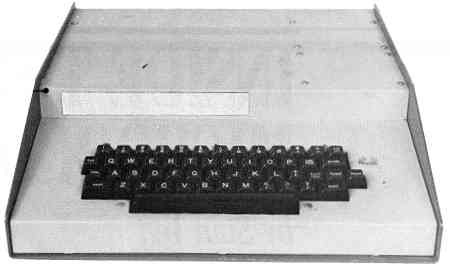COMPUTER QUIZ
Can you name these early personal computer models?
by Stan Veit
They say you can always recognize the pioneers by the arrows sticking out from their backs. That goes for pioneering computers as well as humans. The morgue of the personal computer revolution is filled with the corpses of models that started this industry and then expired for one reason or another. See if you can identify the following machines, all of which are now collector's items.

The first Altair-compatible machine, this was mechanically
superior with a heavy-duty power supply and twenty-two slots to
accommodate future expansion. Its makers were adherents to the est
seminar program, which did not guarantee continued financial
success-though two of the company's principals went on to found the
ComputerLand chain of stores.

What started out as a keyboard terminal to attach to other
computer systems was then given a mind of its own and called a
"terminal computer." Its wooden-sided chassis made it unique. In an era
of 51/4-inch disk drives its manufacturer gave it an 8-inch monster
named Helios, which often malfunctioned and drew so many lawsuits that
the company was dissolved.

Named after the state where it was produced, a kind of knowledge
and a plucky upstart, this computer used the same 6502 microprocessor
favored by the Apple II, its closest rival. It attracted a fanatically
loyal following-including some of the earliest machine-specific user
groups, which survived long after its makers went bankrupt.

Still the only personal computer to offer a choice of microchips
as its main processor. The first system to run the now classic Z-80
microprocessor, it was also the first one that came with an inexpensive
printer for personal use. Referred to as the Denver Donkeys, its
manufacturers were notorious for delivery delays; hence their eventual
demise.

The first all-in-one desktop computer came with built-in
keyboard, CRT screen, interface capability for a modem and printer, and
even a disk drive. Despite substantial investment from local
businessmen, this product of the Beehive State never went into
large-scale production.

Although only 220 were ever manufactured, this bare single-board
computer helped found an industrial empire. Its maker went from being
capitalized by the sale of a used scientific calculator and an old van
to Fortune 500 status within five years. Originally sold for $666, it
drew instant acclaim, yet was quickly outdone by its more complete
successor.
For answers see below
.
.
.
.
.
.
.
.
.
Answers
1. IMSAI 8080
2. Processor Technology's Sol
3. Ohio Scientific Challenger
4. Digital Group
5. Sphere
6. Apple I
Return to Table of Contents | Previous Article | Next Article

